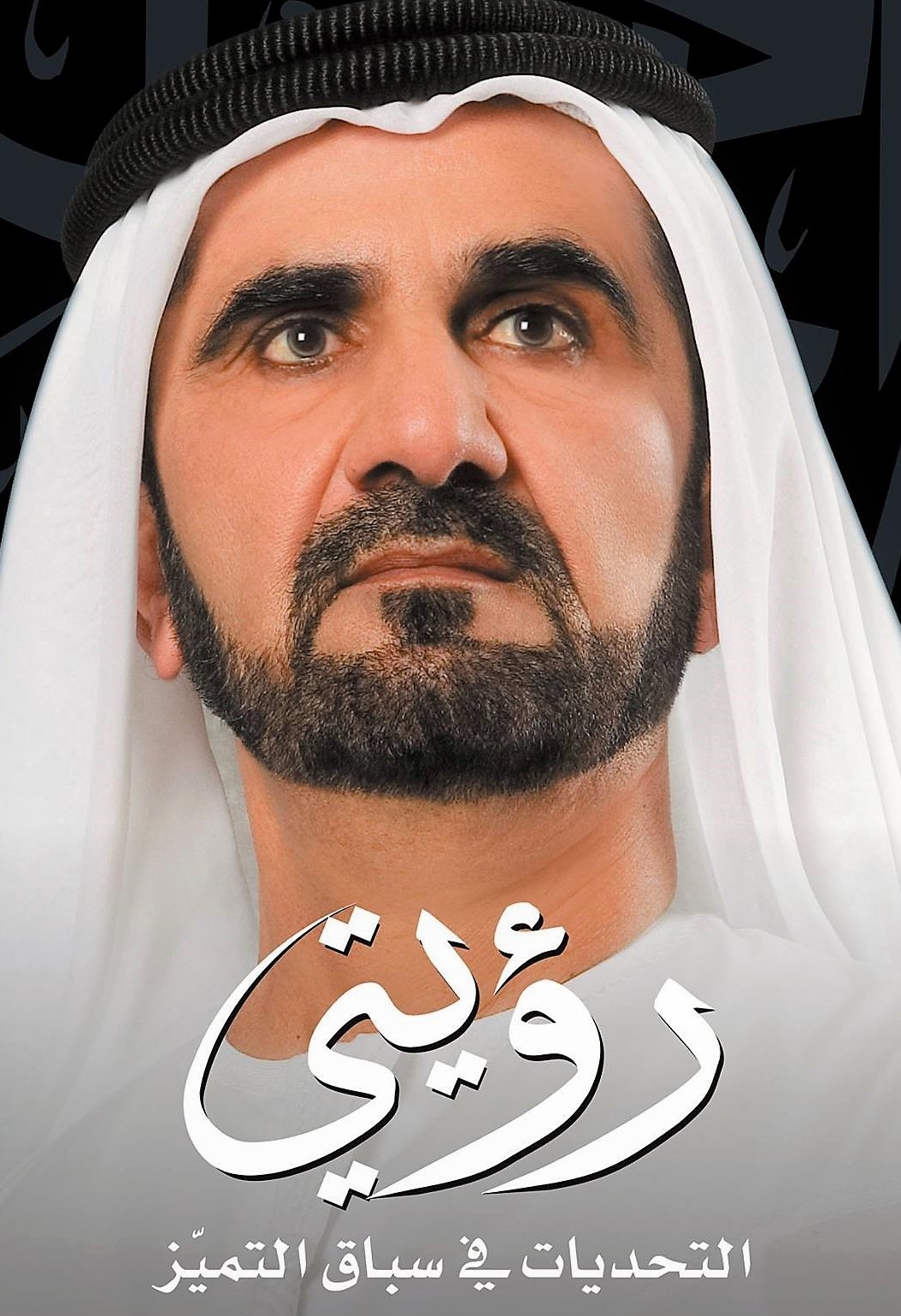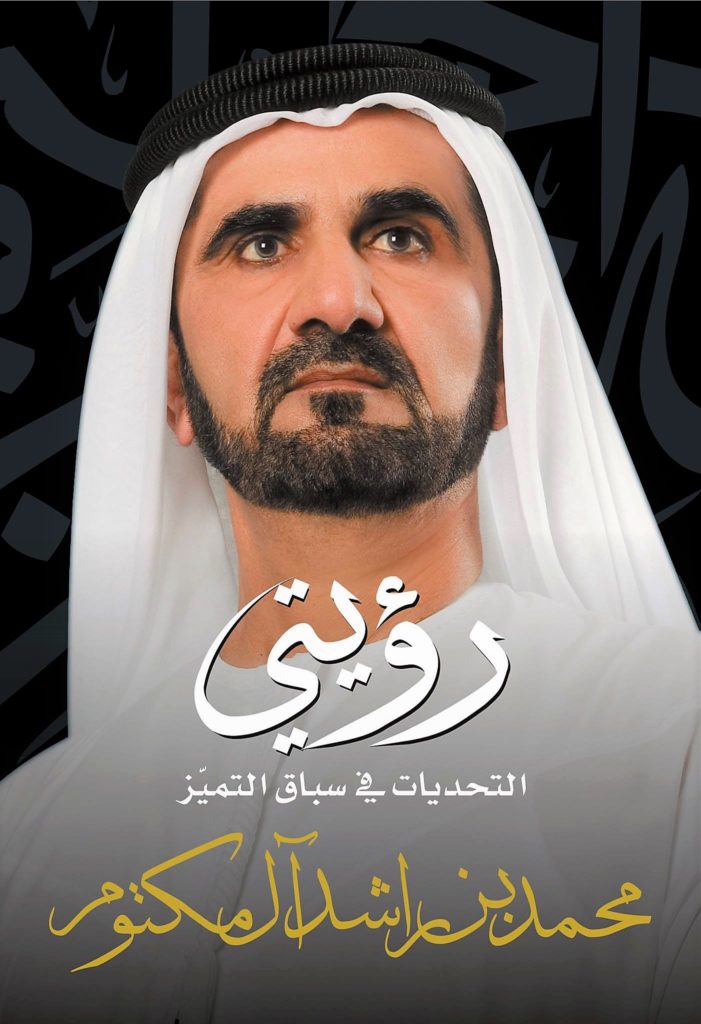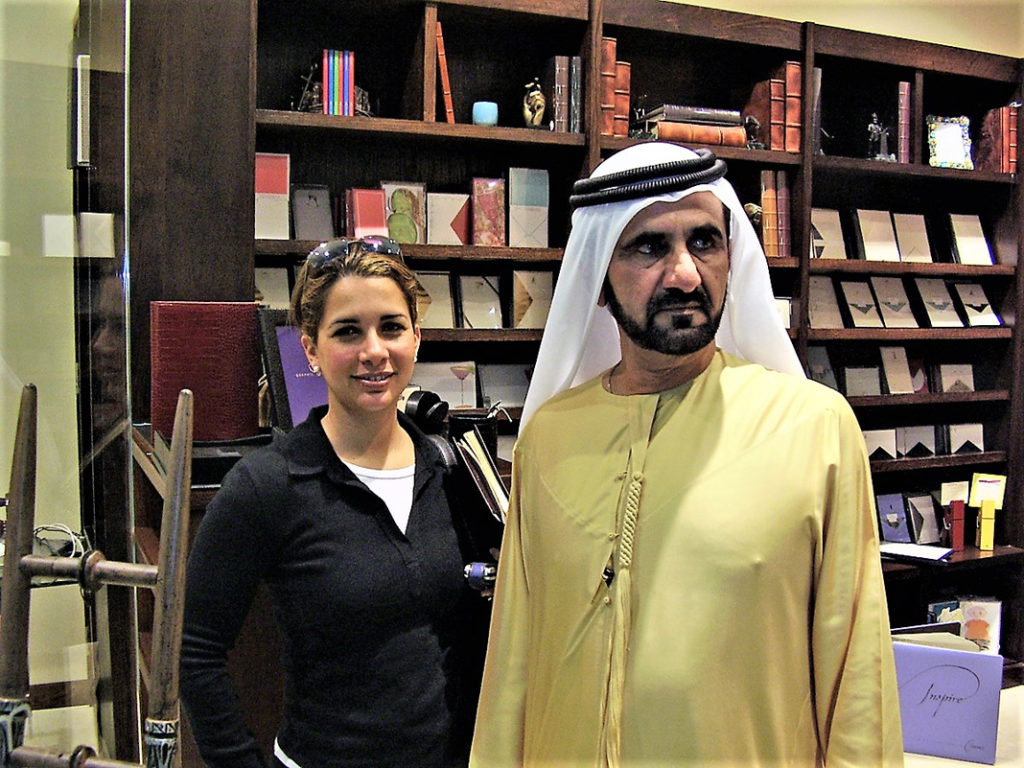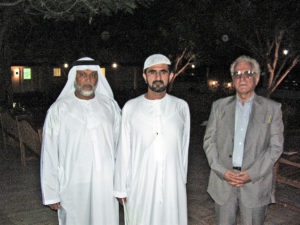
𝗠𝘆 𝗩𝗶𝘀𝗶𝗼𝗻 – 𝗖𝗵𝗮𝗹𝗹𝗲𝗻𝗴𝗲𝘀 𝗶𝗻 𝘁𝗵𝗲 𝗥𝗮𝗰𝗲 𝗳𝗼𝗿 𝗘𝘅𝗰𝗲𝗹𝗹𝗲𝗻𝗰𝗲
SHEIKH MOHAMMAD BIN RASHID PRIME MINISTER OF THE UAE RULER OF DUBAI
Brief Editorial Review

This book is primarily about development as four of the five parts of the title carry the word “development”. The fifth, The Road to the Future, is an overview of future economic developments and covers topics such as Globalization and the economic integration of the Central World Economic Zone (CWEZ) for which Dubai is providing the economic role model, positioning itself as the leading economic and developmental metropolis.
In his book the author reveals, for the first time, the “secrets” that made the Emirate of Dubai one of the most astounding development phenomena in the world. Sheikh Mohammed bin Rashid provides insight into the strategies that can produce excellence in development, including vision, leadership, management, teamwork, and decisive and timely decision taking.
The book is primarily about the development and successful management of countries, presenting Dubai as a role model. This makes the book unique due to the absence of other books in Arabic on this vital subject. It gains further importance due to the authoritative account of the various components of development, based on personal experience and daily involvement rather than on abstract theories and untested experiences.
The book, though, is much more than that. In the chapter Made in Dubai, the author details the nature of development in Dubai: what has been achieved and what will be achieved in the future. The aims and targets set in the book will take the development into the mid-21st century and beyond. Other chapters deal with the challenges met in the course of building modern Dubai, and one is dedicated to horses, as Sheikh Mohammed is an avid rider and one of the most renowned owners of horses worldwide.
The author dedicates the book to H.H. Sheikh Khalifa Bin Zayed Al Nahayan, President of the UAE, but he gives credit for the successes of Dubai to nationals and residents alike and to the public and private sectors in equal terms. Their immense contribution is appreciated and recognized at every stage, and all are called upon to participate in the “consensus planning” of Dubai and the Emirates, as a prerequisite to reaching new heights of development and excellence.
The author is not only addressing the people of Dubai and the Emirates but the entire Arab and Muslim World of 1.3 billion. The success story of Dubai, he believes, can be replicated in other Arab and Muslim countries. The book, therefore, represents a message of optimism that a second stage of outstanding development can be achieved throughout the Arab and Muslim World. The proof he provides is Dubai itself.
A Special Review:
My Vision – Challenges in the Race for Excellence
Sheikh Mohammed, a leader with a vision, unveils the ingredients of Dubai’s success,
provokes Arabs to revive past glories while looking at the future
A Stunning Book from a Man of Stunning Achievements
Monday, April 24, 2006
My Vision – Challenges in the Race for Excellence by Vice-President, Prime Minister of the UAE and Ruler of Dubai, His Highness Sheikh Mohammed bin Rashid Al Maktoum, can be described as a book about the man behind the outstanding success story of Dubai, and the story behind this unique man. But this is just a one side of a multi-faceted volume of exceptional diversity, simplicity, and nothing less than a stunning achievement.
Reviewers of advance copies of the book have described it as perhaps one of the most important works published in the Middle East in the past 50 years. They may not be far off the mark. Books produced more than a century ago by great Arab thinkers like Abdul Rahman Al Kawakibi, Jamal Uddin Al Afghani and Mohammed Abdou had a catalytic impact on the future of the Arab World and the Islamic Umma as both nations, at the time, were attempting to shake off the oppressive shackles of the Turkish Sultans. Later on, exceptional literary, philosophical and historical works were published in Egypt, Syria, Lebanon and other Arab countries, but scientific, economic and social works paled in comparison. Only a handful of such titles can be easily remembered today.
Violence and political unrest in the Arab World must not obscure the fact that the greatest battle awaiting Arabs in the 21st century is the battle for development. Similarly, poverty, underdevelopment and the chaotic, inefficient planning in most Arab countries must not obscure the fact that this region is on the threshold of what could become the greatest development for a thousand years.
Wishful thinking? Not according to Sheikh Mohammed: “All the ingredients necessary for the emergence of an exceptional Arab development are present today and I am confident it will be realized, and confident also of the ability of Arabs to achieve. The exceptional development was a dream once but the dream was embodied in a vision that has made the great Arab State,” he says in the introduction to his book. “The vision suffered a setback and back we went to the old dream, but I do believe there is a chance now to wake up and turn this dream into a clear vision once again. How? I don’t want to begin something I can’t complete within the confines of this introduction so I will leave my book; my vision, with the task of providing the answer.”
In many ways, this is exactly what his book is about: providing answers. How was it possible for Dubai to rise to such towering heights from beneath the sand dunes of time and oblivion, and with so little oil to export? How could Dubai attract more tourists than Egypt, with its Great Pyramids and River Nile? How could it become the largest financial centre in the Middle East, with the most successful airline carrier, the most expansive aluminium smelter, the tallest hotel, the widest seaport and two out of four structures in the world that can be seen from the moon? And what does Dubai have that others don’t? Sand? Every country in the Gulf has that. The sea? They all have it. White, warm beaches? They are everywhere.
The answer is: The people of Dubai and the UAE. There are no more oil wells to drill, so Sheikh Mohammed is poring into the minds of both nationals and residents. This is where the true wealth of nations lies. Their brains are the only true renewable source of wealth; a single exceptional idea could be worth more than all the wells of the largest oil field in the Gulf combined. Microsoft was an idea. How much is it worth?
For nearly 20 years, my father has consistently bet against Dubai and Microsoft alike. He has gained notoriety amongst hardened sceptics but he lost a fortune. Now Sheikh Mohammed is telling us in his book that he plans to double the size of Dubai in the next five years. It is already bursting at the seams of its boundaries, but that is what he is intent on doing.
Even this outstanding project is not enough for the grandest vision of the 21st century. Listen again, carefully, very carefully: “I will not discard an opportunity by waiting for another, but the highs we aim for have not been reached. All that has been achieved is nothing compared to my vision. All that you see around you is merely the beginning of our long road to development. All that you observe are merely small stops on the road to an expansive station, and all that you see merely represent the cornerstones of what is to come. From these, the grand edifice for my people will be built. Then I will wish all other Arab leaders to do the same in their countries, to build the universal Arab development of excellence. The arms of the UAE are stretched towards you, my Arab brothers, so let’s begin.”
What else but overwhelming awe can the reader feel when confronted with such inspiring vision, but to follow him in his journey of development?
I will ask my father, firmly this time, not to bet against Dubai anymore. I know he will lose again and the author will win. Why? Because he has won the bet with so many others all along. Sheikh Mohammed says: “Failure is a great mentor but we have no time to learn from our failures. Simply put, we have no experience in failure. All that we’ve learnt came from the failures of others.”
Microsoft is an idea but so is Emirates Airlines, Emaar, Dubai Holding, Nakheel and dozens of other successful companies and corporations. As long as there are brains that generate such great ideas, Dubai will only grow further. But minds have to be trained in order to produce excellence and here lays the greatest challenge in the Arab World. The author explains: “We could talk about financial resources derived from exporting energy but I would rather talk about the optimum use of these resources because the availability of finance does not necessarily mean the automatic creation of development. Moreover, the true value of money lies not in its volume but in the ways, it is used. You may start a certain project with US $12 million only to see it increase 1,000-fold in 20 years. Alternatively, you may pour billions into another project that bleeds hundreds of millions of dollars a year simply to cover its losses and help to keep its wings raised.”
The author expands on this idea further: “The difference between these types of projects and others is the difference between a good idea and a bad one, and the difference between a bad idea and an excellent idea is between a mind that can generate excellence and another that can’t. This doesn’t mean that the mind that can produce excellence is the mind of a particular nationality or one region of the world and not another, but that we failed to implant in the Arab mind the distinctive thinking process that leads to the production of excellence. Why did we fail to do that? Because we invested handsomely in failed projects and we failed in investing generously in minds. Why again? Because we pile the back of the Arab steed with so many political, social and economic loads that he can’t cope with the weight, and we expect him later to join nimble, well-trained horses and win the race.”
Can the Arabs rise to the challenge? Could they achieve excellence that lasts for 1,000 years? The author believes they could. The proof he offers is Dubai itself. We have succeeded, he tells his Arab brethren, and you can succeed too. With Dubai’s help, he declares, you can achieve it. We can all achieve it together.
Dubaians Are Like This
“Walking or driving alone through the streets of Dubai, I am sometimes overcome by this feeling that I can’t accurately describe. It seems to me something like the translucent shades of dawn or the shadowy folds of late night. I could say that what I really feel is the spirit of Dubai. If I were asked what I meant by that, I may say that this feeling is a mixture of the spirit of this great city and that of its people”.
Thus, starts a section of Chapter 10, described as one of the most beautiful passages in Arabic. Undoubtedly, it is the most melodious song about Dubai and its people. You see,” he continues, “the lips may part but it is the heart that really smiles. Dubaians are like this. The first step in evoking the gentle smile is to uproot the negative energy from peoples’ hearts and empty their chests of despair and frustration. This happens when we do satisfying work that brings us joy and pride. When this happens the morale of each of us will be boosted and we will be nice to others and ourselves. Work days, in such a case, will be an extension of our weekends.”
“Those who live in Dubai are likely to remain in Dubai. Even when they leave us for another city, part of them remains here and many return. I’ve heard stories of people who left for Canada, Europe and the USA only to come back a year or two later with their children ahead of them. Some had a modest beginning with us and grew globally in business and investments. Some bought large companies while others gained advanced work experiences and were lured by large salaries and generous offers of work in other countries. Still, they came back. They left good management to look after their investments abroad, quit their senior posts and returned. Why? There is affinity in Dubai. There are warm surrounding feelings and emotions. This tolerance is observed by all and these traditions are respected by all. There is self-respect and this results in the respect of others. There is balance, excellence and culture. Cordova was like this.”
The author has all the people of Dubai in mind. Nationals will have all the attention and support they need, but resident expatriates are not at all forgotten soldiers: “Dubai needs the effort, creativity and the participation of all those who live in it. Those who have a stake in Dubai’s present will have a stake in its future but they have to safeguard the present and work for their future which is Dubai’s future as well.”
This creative participation is the cornerstone of Sheikh Mohammed’s vision. For him, a vision is legless unless supported by the people, and the people will not participate in turning a vision into reality unless they are convinced of its value, and unless this vision corresponds to their needs and interests. It should move away from theorisation and complexity into clarity and simplicity: Everyone should know that his or her opinion is important in any vision or plan. And each is duty bound to participate in its making, even with a single word. Then, and only then, the national and the resident who participate in making the vision of Dubai become a part of Dubai.

Sheikh Mohammad Bin Rashid and his wife Jordanian Princess Haya at Emirates Towers. Photo by Adel Bishtawi after a meeting to discuss proress of the book My Vision.

Top of post: Front cover of My Vision – Challenges in the Race for Excellence
Cover image: Roger Mkarzel, Beirut, Lebanon
Cover design: WUNDERMAN
COPYRIGHT OWNER Adel Said Bishtawi
My Vision: Challenges in the Race for Excellence -UKCS – RN 258536 – 2006-2016
My Vision: Challenges in the Race for Excellence -UKCS – RN 258536 – 2006-2026